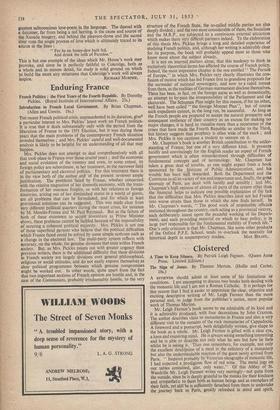Enduring France
French Politics: the First Years of the Fourth Republic, By Dorothy Pickles. (Royal Institute of International Affairs. 25s.) Introduction to French Local Government. By Brian Chapman. (Allen and Unwin. 18s.) THE recent French political crisis, unprecedented in its duration, gives a particular interest to Mrs. Pickles' latest work on French politics. It is true that it deals substantially only with the period from the liberation of France to the 1951 Election, but it was during those years that the main problems of the contemporary French situation revealed themselves ' • and Mrs. Pickles' careful and well-documented analysis is likely to be helpful for an understanding of all that may happen.
Mrs. Pickles does not attempt to deal comprehensively with all that took place in France over those crucial years ; and the economic and social evolution of the country and even, to some extent, its foreign policy are subordinate, in her treatment, to the narrower field of parliamentary and electoral politics. For this treatment there is in the view both of the author and of the present reviewer ample justification. The problems faced by France, whether concerned with the relative stagnation of her domestic economy, with the trans- formation of her overseas Empire, or with her relations to foreign countries, arising out of her diminished status in a world of giants, are all problems that can be formulated, and for which at least provisional solutions can be suggested. This was made clear from very different political quarters during the recent crisis, for instance by M. Mendes-France and M. Paul Reynaud. But as the failure of both of these statesmen to secure investiture as Prime Minister shows, these problems cannot be tackled because of the impossibility of securing a coherent political majority. Mrs. Pickles is not one of those superficial persons who believe that the political difficulties which France faced could be solved by some simple nostrum such as a change in the electoral law. The multi-party system reflects with accuracy, on the whole, the genuine divisions that exist within French society. But, as Mrs. Pickles points out with greater cogency than previous writers, there is the additional difficulty that these divisions tn French society are largely divisions over general philosophical, religious or social attitudes, and do not easily express themselves as clear political programmes between which genuine compromises might be worked out. In other words, quite apart from the fact that two important sections of French opinion are hostile and, in the case of the Communists, probably irredeemably hostile, to the very structure of the French State, the so-called middle parties are also deeply divided ; and the two most considerable of them, the Socialists and the M.R.P., are subjected to a continuous external attraction which makes them very difficult partners indeed. To the elaboration of this thesis Mrs. Pickles brings a long and detailed experience of studying French politics, and, although her writing is admirably clear for its purpose, the book will probably appeal most to those who know most about the subject already.
It is not on internal matters alone, that this tendency to think in exclusively theoretical terms has affected the course of French policy. Indeed, the most impressive chapter is the one entitled " The Pursuit of Europe," in which Mrs. Pickles very clearly illustrates the con- fusion of motive which has led France first to grandiose proposals for the surrender of national sovereignty, and now to a rapid retreat from them, as the realities of German rearmament disclose themselves. There has been, in fact, on the foreign scene as well as domestically, an attempt to by-pass the irresponsibility of the Parliament and the electorate. The Schuman Plan might for this reason, if for no other, well have been called " the foreign Monnet Plan", but of course
such expedients cannot, in the long run, be successful. As long as the French people are prepared to accept the natural prosperity and consequent resilience of their country as an excuse for making no major changes, it is hard to visualise more than a recurrence of the crises that have made the Fourth Republic so similar to the Third, but history suggests that prophecy is often wide of the mark ; and Mrs. Pickles is too cautious a student to venture on it.
Mr. Chapman's book is another British contribution to the wider- standing of France, but one of a very different kind. It presents lucidly and convincingly for the English reader an aspect of French government which is often misunderstood through difficulties of fundamental concepts and of terminology. Mr. Chapman has taken a great deal of trouble, as one might expect from a book sponsored by the Institute of Public Administration, and his trouble has been well rewarded. Both the Department and the Commune in all its variety of size and importance and, finally, the great anomaly of Paris, are dealt with lucidly and sensibly ; and Mr. Chapman's high opinion of almost all parts of the system other than the financial helps to indicate one possible explanation of the fact that the difficulties that Mrs. Pickles describes have not led France into worse straits than those in which she now finds herself. In Mr. Chapman's words, " The good work of respOnsible officials stationed throughout the country, each acting as a provincial viceroy, each deliberately intent upon the peaceful working of his Depart- ment, and each providing material on which to base policy, is in large part responsible for the fundamental stability of French life." One's only criticism is that Mr. Chapman, like some other products of the Oxford P.P.E. School, tends to overlook the necessity for
historical depth in contemporary studies. MAX BELOFF.


































 Previous page
Previous page